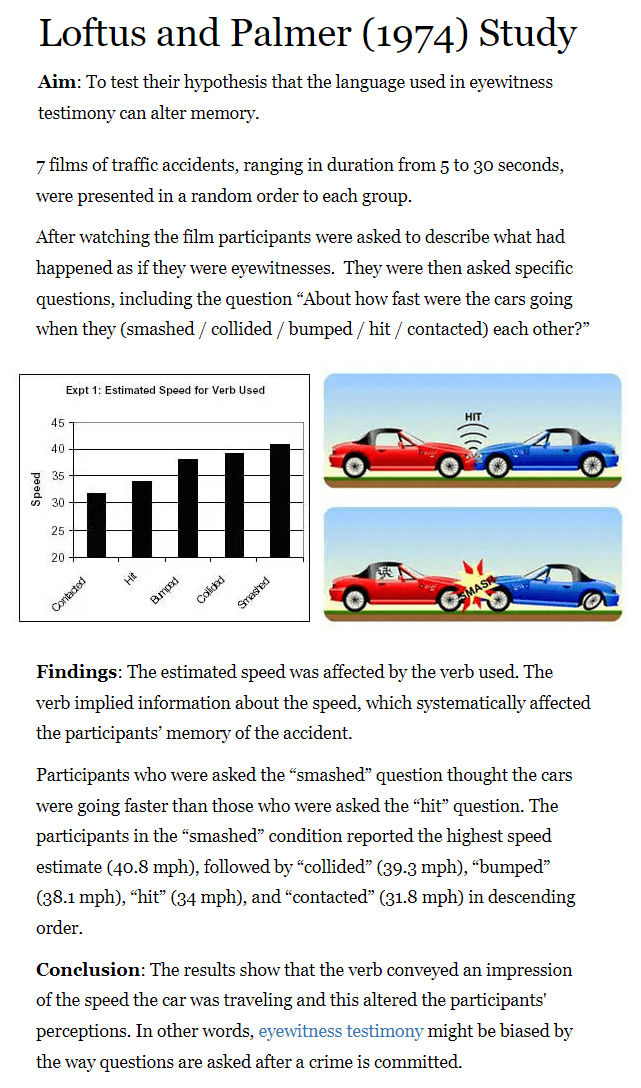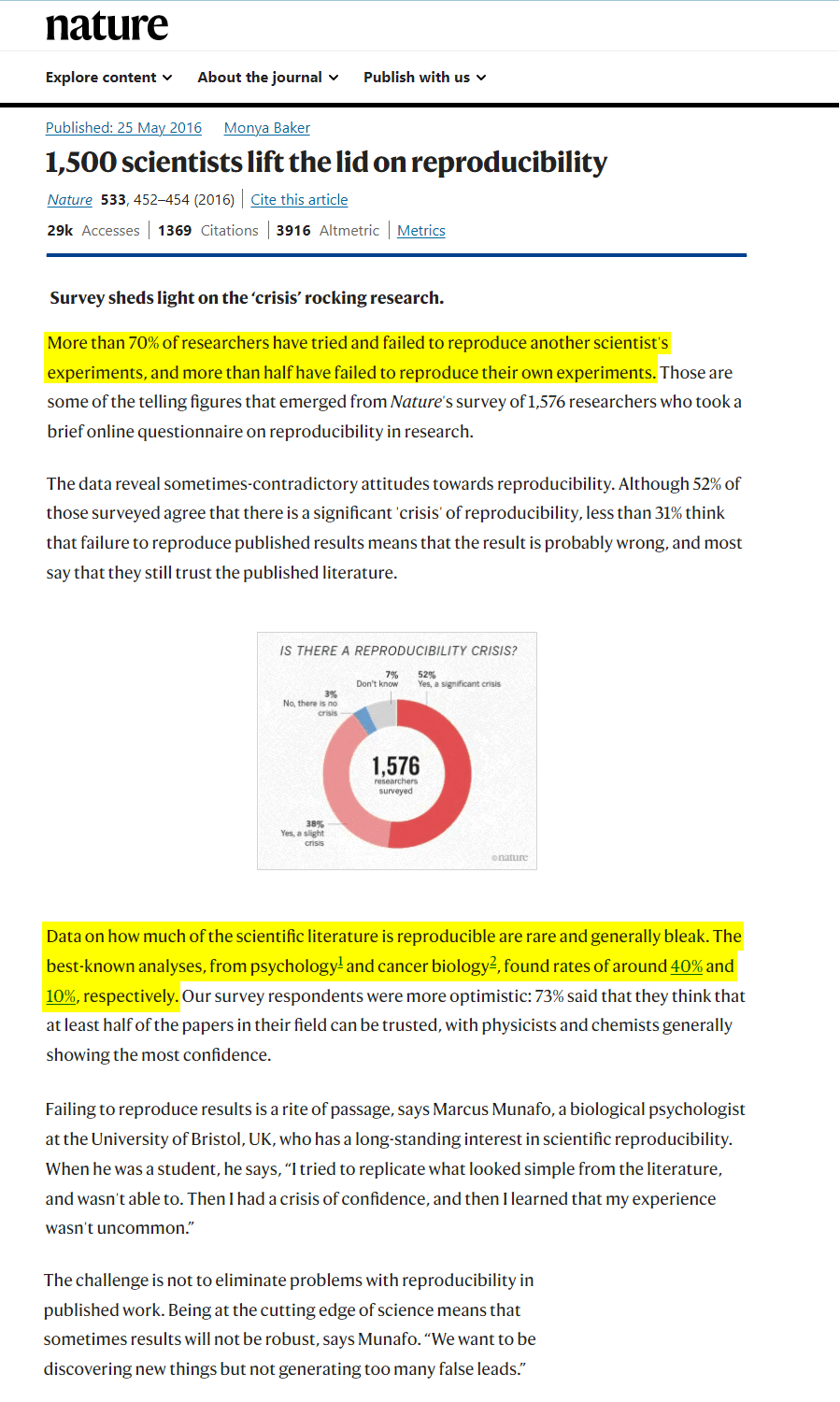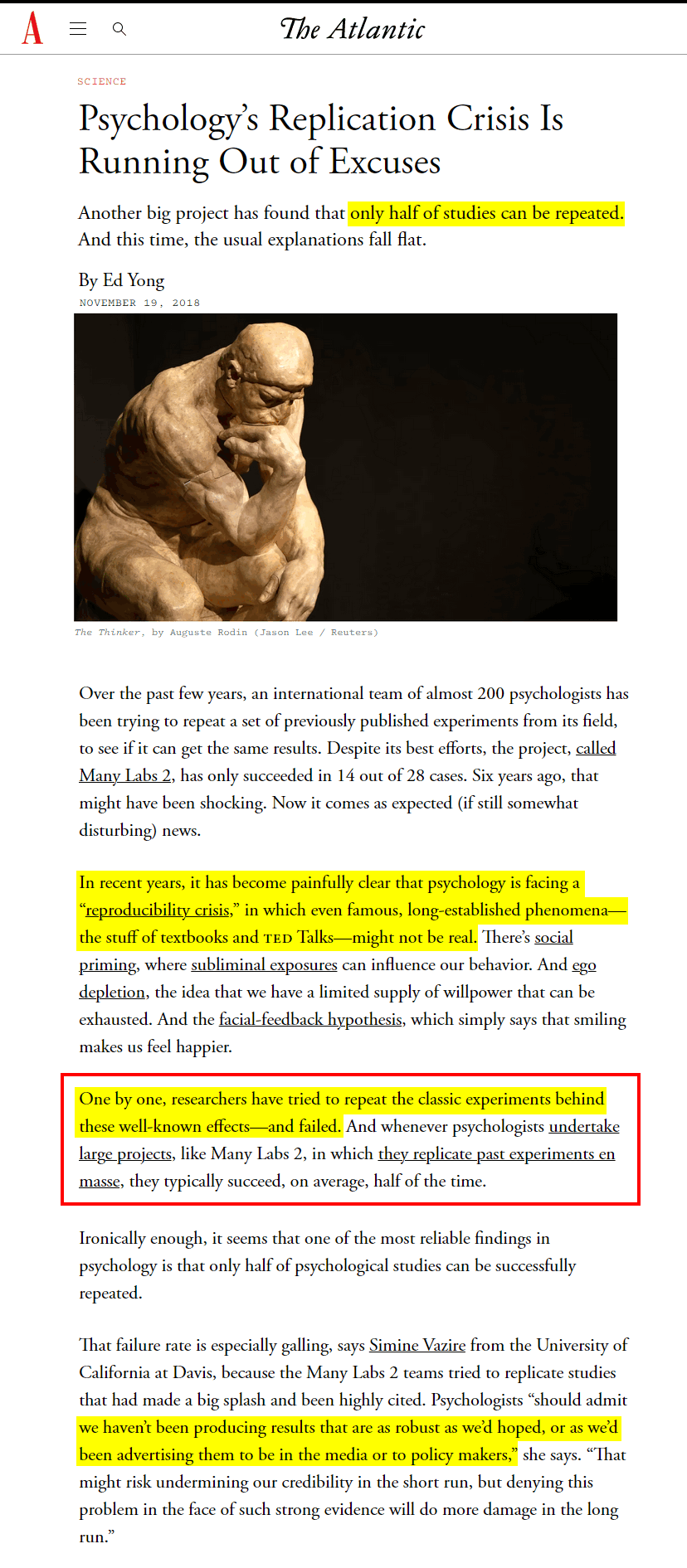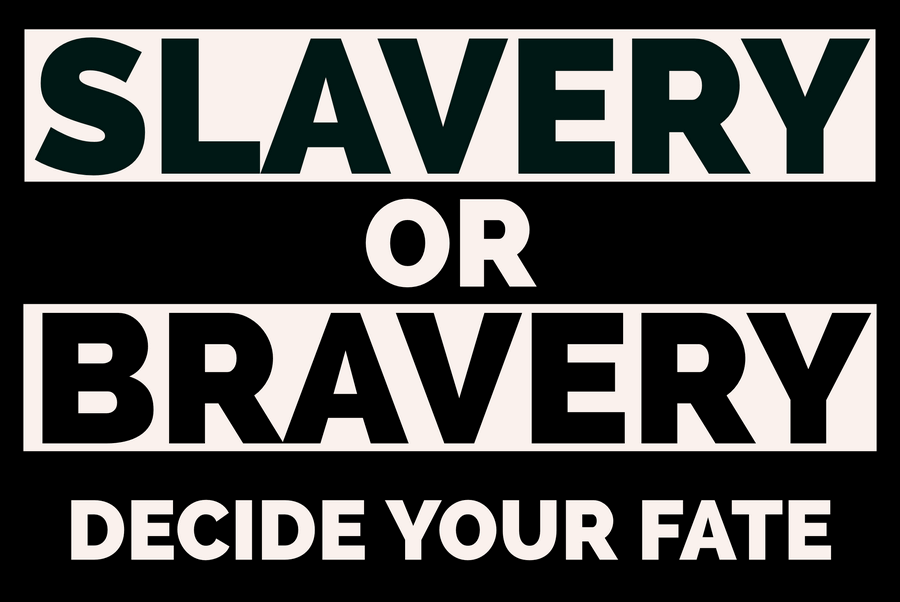Perception control through subtle word choice – the 1974 Loftus and Palmer study
This is one of the classic examples from persuasion research. The unreliability of eyewitness testimony, and the power of leading questions.
Participants were more likely to say the cars were going faster when asked “How fast were they going when the cars smashed into each other?” compared to “How fast were they going when the cars bumped into each other?”
By changing one simple word in the description of an event the participants had just witnessed, researchers could bias their answers and rewrite their memories without anybody knowing it had happened.

The media manipulation empire has been studying human psychology for generations. It knows precisely how to bias responses to certain events by controlling some of the simplest language patterns.
![Breitbart article screenshot. The headline reads: "J Scott Armstrong: Fewer Than 1 Percent Of Papers in Scientific Journals Follow Scientific Method".
Fewer than 1 percent of papers published in scientific journals follow the scientific method, according to research by Wharton School professor and forecasting expert J. Scott Armstrong.
Professor Armstrong, who co-founded the peer-reviewed Journal of Forecasting in 1982 and the International Journal of Forecasting in 1985, made the claim in a presentation about what he considers to be “alarmism” from forecasters over man-made climate change.
“We also go through journals and rate how well they conform to the scientific method. I used to think that maybe 10 percent of papers in my field … were maybe useful. Now it looks like maybe, one tenth of one percent follow the scientific method” said Armstrong in his presentation, which can be watched in full below. “People just don’t do it.”
Armstrong defined eight criteria for compliance with the scientific method, including full disclosure of methods, data, and other reliable information, conclusions that are consistent with the evidence, valid and simple methods, and valid and reliable data.
Criteria for compliance with science.
Eight well-established criteria for judging whether a paper complies with the scientific method (for policy making) based on definitions of science over the ages are:
1. Objective: Tests multiple reasonable hypotheses
2. Useful findings (effect size is important for decision making)
3. Full disclosure of methods, data and other relevant information
4. Comprehensive review of prior knowledge
5. Valid and reliable data
6. Valid and simple methods
7. Experimental evidence provided
8. Conclusions consistent with the evidence
According to Armstrong, very little of the forecasting in climate change debate adheres to these criteria. “For example, for disclosure, we were working on polar bear [population] forecasts, and we were asked to review the government’s polar bear forecast. We asked, ‘could you send us the data’ and they said ‘No’… So we had to do it without knowing what the data were.”
According to Armstrong, forecasts from the Intergovernmental Panel on Climate Change (IPCC) violate all eight criteria.](https://mediatricks.org/wp-content/uploads/2022/01/science-doesnt-follow-the-scientific-method.png)
![Article screenshot: "J Scott Armstrong on Breitbart News Daily: ‘No One Asks’ Researchers To Follow Scientific Method".
Earlier in the week, we covered a study from Wharton School professor J. Scott Armstrong and Dr. Kesten Green which claims that only a fraction of 1 percent of the papers published in scientific journals follow the scientific method. Professor Armstrong appeared on Breitbart News Daily today to discuss his research with editor-in-chief Alex Marlow.
“The problem in journals, with government research, and with universities is that nobody asks them to follow [it]. I’ve been publishing for 55 years and can’t ever recall anyone saying ‘you should follow the scientific method.'”
Armstrong, along with Dr Kesten Green developed a checklist of eight criteria to assess whether a paper or a study follows the scientific method. According to the checklist, scientific studies must (1) test multiple reasonable hypotheses, (2) provide useful findings, (3) fully disclose methods, data, and other relevant information, (4) conduct a comprehensive review of prior knowledge, (5) use valid and comparable data, (6) use valid and simple methods, (7) provide any experimental evidence, (8) reach conclusions consistent with the evidence.
“So, [Dr.] Kesten Green and I got involved with this to develop a simple checklist that would help people to say ‘are you following the scientific method?’ If you’re going to fly a plane, if you’re going to be a doctor and operate, you have to use a checklist, and if you use a checklist you are much more effective. Nothing like that exists right now.”
“There is one exception, and that is PLOS One, Public Library of Science One actually provides a checklist. I think it took them about five years before they became the largest scientific journal in the world, so they’ve really revolutionized things.”
“What’s happening now is, government research, universities — they’re asking for what I call advocacy research. They have something, they want you to prove it, make sure you prove it, you do, you keep getting paid.”
“Advocacy research is the bulk of these 99 percent of non-scientific studies, and they’re not done for scientific development, they’re done to support a political idea. If you want to make money in universities these days, you publish papers that support global warming and you live handsomely.”
Armstrong said that the problem of ideologically-driven research had been a problem since at least the 1920s, but that it has intensified in recent years with the “vast growth of government funding for research.”
“I agree with many of the greats of the past when I say that the government should not be involved in research.”
Armstrong reiterated his argument that the Intergovernmental Panel on Climate Change (IPCC) violates all eight of his checklist for following the scientific method. “If you don’t believe me, you can go and look at their work and you can use that checklist.”](https://mediatricks.org/wp-content/uploads/2022/01/Published-Science-Lacking-the-Scientific-Method.png)





